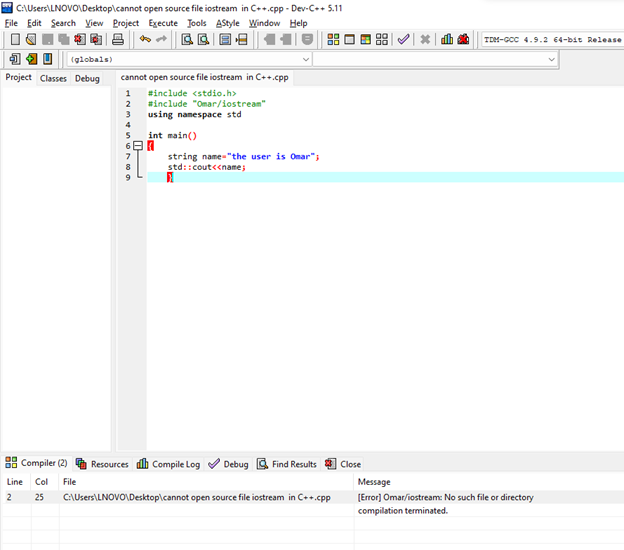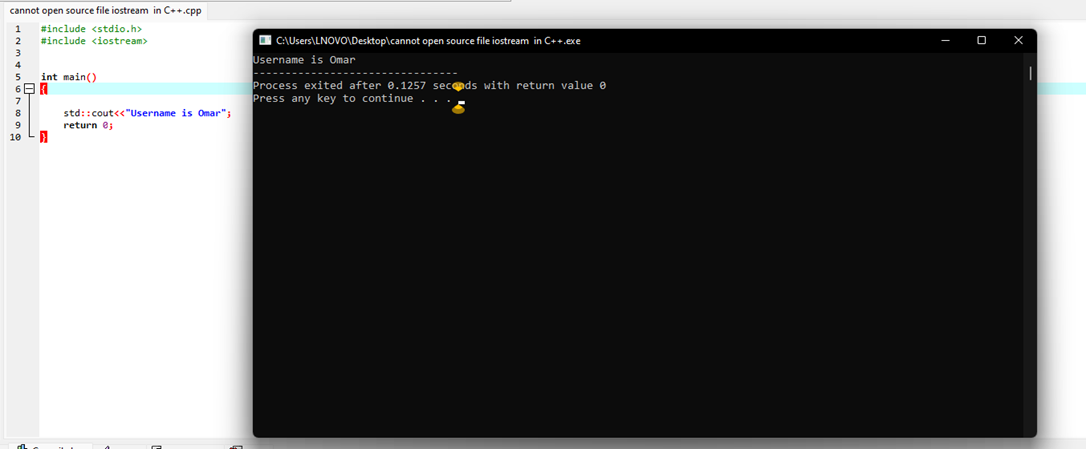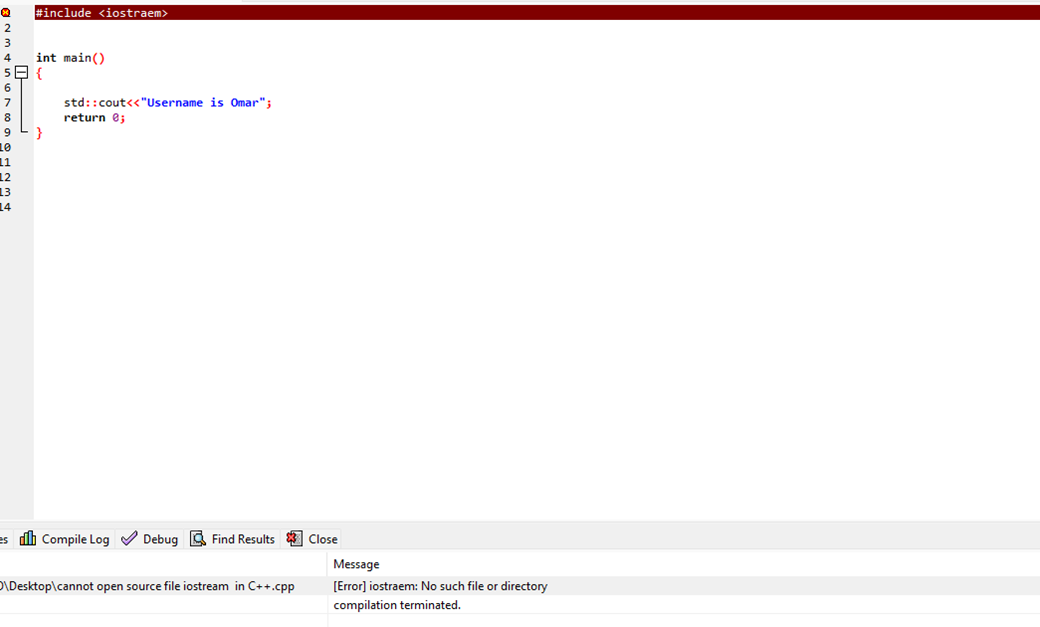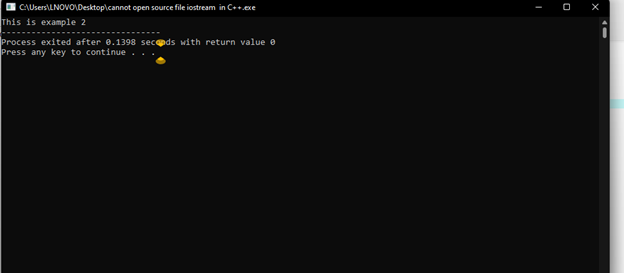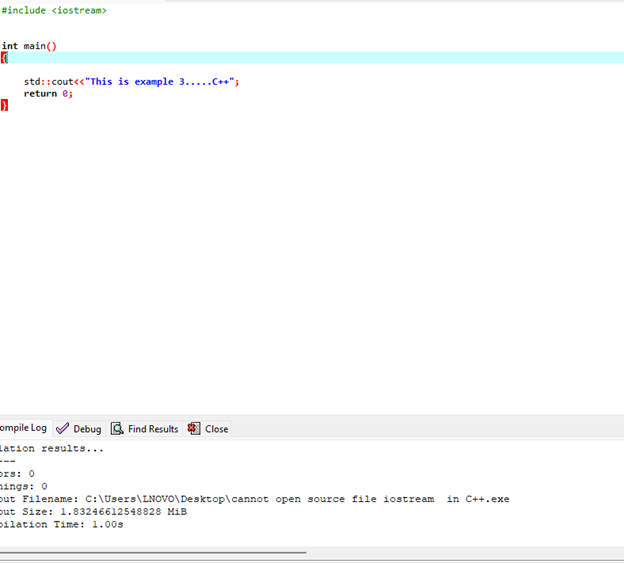This article is about the most common error in C++ during code execution. The error is that the source file cannot open to display the output in C++. The source file is the file that has all the code with the “.cpp” extension. This error can be perplexing but is often straightforward to resolve. This error occurs when the compiler cannot find the “iostream” header, the fundamental in C++, during code execution to display the input and output on the console screen. There are many issues behind the occurrence of this error. Let’s discuss this error in the following section with proper examples.
Example 1:
This example is related to this error that is caused by the path specification in the “header
is not correct”. The code snippet of this example is attached as follows:
#include "Omar/iostream"
using namespace std
int main()
{
string name="the user is Omar";
std::cout<<name;
}
Here, we want to display the string on the console window using the C++ programming language. We define the libraries that are required to display the output. Here, we take an “iostream” library that is inside the folder at any specific location or by specifying the library path in the code. After that, we take a variable that is a string. The next line is to display this string on the console window using the “cout” stream that is already defined in the “iostream” library.
Click on the “Execute” option. Then, click on the “run” option to compile and execute the code.
The output of this code is given in the following screenshot:
The “cannot open source file iostream in C++.cpp” error appears upon code compilation. This error occurs in line 2 as shown in the given screenshot. In the code, the “iostream” header is defined in line 2 which is “#include “Omar.iostream””. This seems that the path that is specified is not correct.
Solution for this Error:
The solution to this error is to correct the path of the specified “iostream” library header. We remove the “Omar” folder from the “iostream” header file. Now, we run the code and show the result.
Example 2:
This example is also about this error that occurs mostly because the header inclusion is not accurate or correct. In some cases, we write the code in such a hurry and make spelling mistakes in the code which cause the errors in execution time. The code snippet related to this example is given as follows:
int main()
{
std::cout<<"Username is Omar";
return 0;
}
The output of this code is attached in the following:
This screenshot shows that the code is not working fine and generates the “cannot open source file” error in line 1. Let’s overview line 2 which is highlighted. We can see that the spelling of “iostream” is not correct. As shown in the screenshot, “iostraem” is not a defined header in C++.
Always remember that if an error occurs in our code, there is no need to panic. Just read the error and check on which line this error occurred. The solution to this error is obvious and straightforward. We correct the spelling of the header as <iostream>. After that, execute the code and confirm whether this error is resolved. As we can see, the code is executed successfully.
The code is executed correctly and displays the output on the screen. This error is caused by the output and input streams (cin and cout) that are defined in the “iostream” header. So, when the compiler reads the code step by step, it notices that the spelling of the header is not defined or matched at any cost and then generates an error to make them correct.
Example 3:
This is the third use case in which we can see how this error occurs when the installation of the C++ setup is not completed. During the installation of the C++ setup, the installation is corrupted or not completed because of many reasons such as light issues, space issues, etc. The code snippet of this case is attached as follows:
int main()
{
std::cout<<"This is example 3.....C++";
return 0;
}
When we run the code, the compiler gives the “cannot open source file iostream in C++ file” error. This may be due to the C++ software installation issues that we downloaded from different websites. Some websites provide the link and download the setup that causes this type of issue. The following is the output:
The output of this example generates the “cannot open source file iostream in C++” error at line 1. This type is to ensure that your setup installation is not completed.
None of the websites on the internet are valid and secure to use. So, always download the setup from the top-rated websites to avoid the installation configuration issue during code execution. The solution is to remove this C++ tool from the system and install the authenticated tool with proper configuration steps.
Example 4:
This is the last example in which we will learn why this type of issue occurs and how we can handle these types of errors to produce the desired output on the screen. Here, we will see how this type of error is caused just because the header file is missing. Many beginners make this type of mistake and then the errors are generated in their code. The code snippet of this cause is attached in the following:
int main()
{
std::cout<<"This is example 4.....C++ programming world";
return 0;
}
When we run this code, it generates an error which states that it cannot open the source file stream in C++. The screenshot of this output is attached in the following:
For file stream, we just need to define a library or header in our code which is #include<iostream>. In this code, this library is missing. The solution is to add the header in the program.
Conclusion
At the end of this article, we conclude that many errors occur due to human mistakes or system installation issues. The “cannot open source file “iostream”” error is not complex to resolve. Remember that we can catch up on the errors mostly in C++ through their error messages on the terminal. Here, we discussed the different types of reasons behind the occurrence of this error. The users can easily resolve this error by applying any of the mentioned cases.

